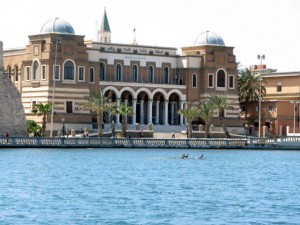By Ali Salem.

Tripoli, 9 December 2014:
The Central bank is warning that corruption, collapsing oil income, the almost total failure of customs . . .[restrict]collections and the rising cost of food subsidies is heading the country toward a serious financial crisis.
Since disruptions to wellhead production and export terminals began in August 2013, Libya’s oil income has fallen dramatically. At the end of last year its had stood at LD 59.1 billion. As of November, it had reached only LD 19.2 billion.
The CBL has called for a clampdown on corruption, particularly over the apparently large number of state-sector “ghost salaries” paid the people who already have other jobs.
The bank is also questioning the sustainability of subsidies for food and fuel. The latter encourage smuggling of LPG, petrol and diesel to neighbouring countries, particularly Tunisia and Egypt. A year ago the Zeidan government was talking about phasing out fuel subsidies , which it said, benefited only the smugglers. In return for realistically price fuel, Libyans would have been given allowances, linked to their national identity cards.
Indeed the CBL is insisting, alongside its warning of an early financial crisis, that payments to individuals should only be made against checked identity card numbers.
The CBL has said that it is reluctant to drawn down on its foreign currency reserves, though international sources have said recently that this is precisely what has been happening.
The Bank’s problems are being compounded by the falling international oil price, which is reducing its US dollar income. However against this is the falling value of the Libyan Dinar against hard currencies. Unofficial “gold market” rates, as quoted today by the Libya Observer are
USD/LYD 1.685
EUR/LYD 2.06
GBP/LYD 2.58
EGP/LYD 4.65
TND/LYD 1.14
The irony is that while the total US dollar income falls, the declining rate of the dinar is helping sustain the CBL’s dinar income.
[/restrict]






